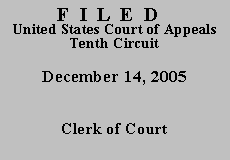

| BOBBY DEAN SMITH, |
|
| v. | |
| RANDY PARKER, Warden, and ATTORNEY GENERAL OF THE STATE OF OKLAHOMA, |
On October 3, 2000, Smith pled guilty in Oklahoma state court to attempted manufacture of a controlled substance. He was sentenced to twenty years in prison, the statutory minimum under Oklahoma Statutes Title 63, § 2-401. Effective July 1, 2001, however, this provision was modified, imposing a seven-year mandatory minimum. 2001 Okla. Sess. Law Serv. Ch. 437 (S.B. 397) (West). The record indicates that he subsequently sought post-conviction relief in state court on July 10, 2003, and May 6, 2004. On December 10, 2004, he sought a writ of habeas corpus in federal court based on the change in § 2-401. The district court dismissed his petition as untimely, and this appeal followed.
Before an appellant may proceed on an appeal from a denied § 2254 petition, he must receive a COA. 28 U.S.C. § 2253(c)(1). We may issue a COA "only if the applicant has made a substantial showing of the denial of a constitutional right." 28 U.S.C. § 2253(c)(2). Where a district court does not reach the merits of a § 2254 petition because the claim was procedurally defaulted, the appellant seeking a COA must also demonstrate "that jurists of reason would find it debatable whether the district court was correct in its procedural ruling." Slack v. McDaniel, 529 U.S. 473, 484 (2000).
Here, reasonable jurists would not find the district court's procedural ruling debatable or wrong. A petitioner may file a habeas petition for one year after "the date on which the factual predicate of the claim or claims presented could have been discovered through the exercise of due diligence." 28 U.S.C. § 2244(d)(1)(D). This time is statutorily tolled while a properly filed application for state post-conviction relief is pending. 28 U.S.C. § 2244(d)(2). But if the statute of limitations runs before the petitioner initiates the state proceeding, then the time is not tolled. See, e.g., Fisher v. Gibson, 262 F.3d 1135, 114243 (10th Cir. 2001). The time can also be equitably tolled in "rare and exceptional" cases where "an inmate diligently pursues his claims and demonstrates that the failure to timely file was caused by extraordinary circumstances beyond his control." Burger v. Scott, 317 F.3d 1133, 1141 (10th Cir. 2003) (quoting Marsh v. Soares, 223 F.3d 1217, 1220 (10th Cir. 2000)).
Even under the most lenient calculations, there can be no dispute that Smith's petition was untimely. His conviction was final on October 13, 2000, ten days after the judgment was entered in his case. See Fisher, 262 F.3d at 1142. The Oklahoma amendment on which Smith bases his claim was effective on July 1, 2001, almost a year after his guilty plea. Even assuming that this after-the-fact legislative amendment started the one-year clock, Smith's petition is untimely because he did not file his federal habeas petition until December 10, 2004. Nor would his efforts to seek state post-conviction relief toll the statute of limitations, since he did not file his petition before the July 1, 2002, filing deadline required under federal law. Finally, he has shown no reason that would justify equitable tolling.
Reasonable jurists would not find these procedural rulings debatable or wrong, so we DENY Smith's application for a COA and DISMISS his appeal. We also DENY Smith's motion to appoint counsel.
Entered for the Court
Timothy M. Tymkovich
Circuit Judge
*. This order is not binding precedent, except under the doctrines of law of the case, res judicata, and collateral estoppel. The court generally disfavors the citation of orders; nevertheless, an order may be cited under the terms and conditions of 10th Cir. R. 36.3.
2. After examining the briefs and the appellate record, this three-judge panel has determined unanimously that oral argument would not be of material assistance in the determination of this appeal. See Fed. R. App. P. 34(a); 10th Cir. R. 34.1(G). The cause is therefore ordered submitted without oral argument.